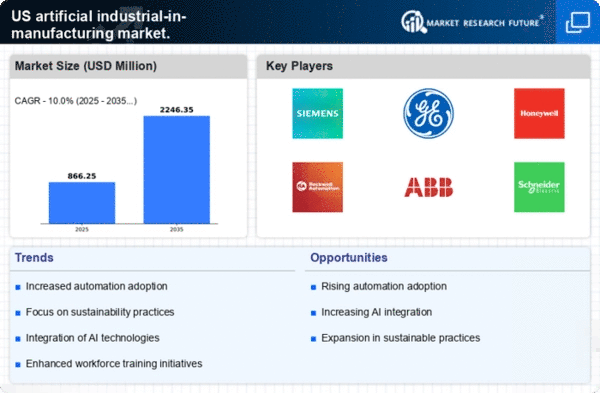Supply Chain Optimization
Supply chain optimization is becoming increasingly vital in the artificial industrial-in-manufacturing market. Companies are leveraging AI and data analytics to enhance supply chain efficiency, reduce costs, and improve delivery times. The ability to predict demand accurately can lead to a reduction in inventory costs by up to 25%. Furthermore, AI-driven supply chain solutions enable manufacturers to respond swiftly to market changes, ensuring that production aligns with consumer demand. This optimization is essential for maintaining competitiveness in a rapidly evolving market landscape, suggesting that the artificial industrial-in-manufacturing market will continue to grow as companies prioritize supply chain enhancements.
Rising Demand for Customization
The artificial industrial-in-manufacturing market is witnessing a growing demand for product customization. Consumers are increasingly seeking personalized products, prompting manufacturers to adopt flexible production systems. This shift necessitates the implementation of advanced technologies, such as AI and robotics, to facilitate rapid changes in production lines. According to industry reports, 70% of consumers express a preference for customized products, which drives manufacturers to innovate. Consequently, companies are investing in technologies that enable mass customization, thereby enhancing customer satisfaction and loyalty. This trend is likely to propel the artificial industrial-in-manufacturing market forward, as businesses adapt to meet evolving consumer preferences.
Increased Focus on Cybersecurity
As the artificial industrial-in-manufacturing market becomes more digitized, the focus on cybersecurity is intensifying. Manufacturers are increasingly aware of the risks associated with cyber threats, which can disrupt operations and compromise sensitive data. In response, companies are investing in robust cybersecurity measures to protect their systems and data. The cybersecurity market for manufacturing is projected to grow by 15% annually, reflecting the urgency of addressing these challenges. This heightened emphasis on cybersecurity not only safeguards manufacturing processes but also fosters trust among consumers and partners, thereby supporting the overall growth of the artificial industrial-in-manufacturing market.
Technological Advancements in AI
The artificial industrial-in-manufacturing market is experiencing a surge in technological advancements, particularly in artificial intelligence (AI) and machine learning. These innovations enhance operational efficiency and reduce production costs. For instance, AI-driven predictive maintenance can decrease downtime by up to 30%, leading to significant savings. Furthermore, the integration of AI in manufacturing processes allows for real-time data analysis, enabling companies to make informed decisions swiftly. As a result, manufacturers are increasingly investing in AI technologies, with the market projected to reach $15 billion by 2027. This trend indicates a robust growth trajectory for the artificial industrial-in-manufacturing market, as companies seek to leverage AI to maintain competitive advantages.
Government Initiatives and Support
Government initiatives play a crucial role in shaping the artificial industrial-in-manufacturing market. Various federal and state programs aim to promote advanced manufacturing technologies, including AI and automation. For example, the Manufacturing USA initiative provides funding and resources to support research and development in manufacturing technologies. Such initiatives are designed to enhance the competitiveness of the manufacturing sector, potentially leading to a 20% increase in productivity over the next decade. As a result, manufacturers are encouraged to adopt innovative technologies, which could significantly impact the growth of the artificial industrial-in-manufacturing market.
















